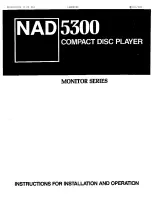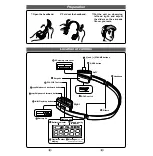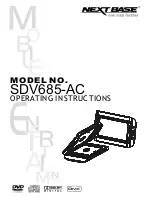
Ref
e
rence
RQT69
7
7
23
Glossary
Bitstream
The digital form of multi-channel data (e.g. 5.1 channel) before decoding.
Decoder
A decoder restores coded audio signals on DVDs to normal.
Dolby Digital
This is a method of coding digital signals developed by Dolby
Laboratories. Apart from stereo (2-channel) audio, these signals can also
be multi-channel audio. A large amount of audio information can be
recorded on one disc using this method.
Dolby Pro Logic
A surround system where a 4-channel audio track is recorded as
2 channels and then is restored to 4 channels for play. The surround
channel is monaural and can reproduce up to 7 kHz.
DTS (Digital Theater Systems)
This surround system is used in many movie theaters around the world.
There is good separation between the channels, so realistic sound effects
are possible.
Dynamic range
Dynamic range is the difference between the lowest level of sound that
can be heard above the noise of the equipment and the highest level of
sound before distortion occurs.
Film and video
DVD-Videos are recorded using either film or video. Usually, film is
recorded at 24 frames per second, the rate movies are filmed at, while
video is recorded at 30 frames per second.
Frame still and field still
Frames are the still pictures that make moving pictures. About thirty are
shown each second. A frame still may appear blurred but overall quality is
high.
Two fields appear alternately to make up one frame. A field still is not
blurred but picture quality is lower.
Interlace and progressive output
NTSC, the video signal standard, has 480 interlaced (I) scan lines,
whereas progressive scanning uses twice the number of scan lines. This
is called 480P.
I/P/B
MPEG 2, the video compression standard adopted for use with DVD-
Video, codes frames using these 3 picture types.
I: Intra coded picture
This picture has the best quality and is the best to use when adjusting the
picture.
P: Predictive coded picture
This picture is calculated based on past I or P-pictures.
B: Bidirectionally-predictive coded picture
This picture is calculated by comparing past and future I and P-pictures
so it has the lowest volume of information.
Linear PCM (pulse code modulation)
These are uncompressed digital signals, similar to those found on CDs.
Signal system
NTSC
Operating temperature range:
i
5 to
i
35
o
C (
i
41 to
i
95
o
F)
Operating humidity range:
5 to 90 % RH (no condensation)
Discs played [8 cm (3
z
) or 12 cm (5
z
)]:
(1) DVD-RAM (DVD-VR compatible)
(2) DVD-Audio
(3) DVD-Video
(4) DVD-R (DVD-Video compatible)
(5) CD-Audio (CD-DA)
(6) Video CD
(7) SVCD (Conforming to IEC62107)
(8) CD-R/CD-RW (CD-DA, Video-CD formatted discs)
(9) MP3/WMA
≥
Maximum number of tracks and groups recognizable: 999 tracks
and 99 groups
≥
Compatible compression rate:
MP3: between 32 kbps and 320 kbps
WMA: between 48 kbps and 192 kbps
(10) JPEG
≥
Exif Ver 2.1 JPEG Baseline files
≥
Maximum number of pictures and groups recognizable: 3000
pictures and 300 groups
≥
Picture resolution: between 320
t
240 and 6144
t
4096 pixels
(Sub sampling is 4:2:2 or 4:2:0)
(11) HighMAT Level 2 (Audio and Image)
Video output:
Output level:
1 Vp-p (75
≠
)
Output terminal:
Pin jack (1 system)
S-video output:
Y output level:
1 Vp-p (75
≠
)
C output level:
0.286 Vp-p (75
≠
)
Output terminal:
S terminal (1 system)
Component video output (480P/480I)
Y output level:
1 Vp-p (75
≠
)
P
B
output level:
0.7 Vp-p (75
≠
)
P
R
output level:
0.7 Vp-p (75
≠
)
Output terminal:
Pin jack
(1 system, Y: green, P
B
: blue, P
R
: red)
Audio output:
Output level:
2 Vrms (1 kHz, 0 dB)
Output terminal:
Pin jack
Number of terminals:
2 channel:1 system
5.1-channel discrete output (5.1-channel):1 system
Audio performance:
(1) Frequency response:
≥
DVD (linear audio):
4 Hz–22 kHz (48 kHz sampling)
4 Hz–44 kHz (96 kHz sampling)
≥
DVD-Audio:
4 Hz–88 kHz (192 kHz sampling)
≥
CD audio:
4 Hz–20 kHz
(2) S/N ratio:
≥
CD audio:
115 dB
(3) Dynamic range:
≥
DVD (linear audio):
102 dB
≥
CD audio:
98 dB
(4) Total harmonic distortion:
≥
CD audio:
0.0025 %
Digital audio output:
Optical digital output:
Optical terminal
Pickup:
Wave length:
658 nm/790 nm
Laser power:
CLASS
II
a/CLASS
I
Power supply:
AC 120 V, 60 Hz
Power consumption:
15 W
Dimensions:
430 (W)
k
405 (D)
k
59.7 (H) mm
[16
15
/
16
z
(W)
k
15
31
/
32
z
(D)
k
2
11
/
32
z
(H)]
Mass:
4.1 k
g
(9.02 lb.)
Power consumption in standby mode:
approx. 0.6 W
[Note]
Specifications are subject to change without notice. Mass and dimensions
are approximate.
Specifications






































